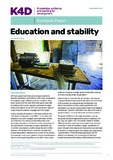Education and Stability: Synopsis Paper
Abstract
DFID are aware that there are strong connections between education and stability which have implications
for programming in different country contexts. Fiftyseven percent of the total DFID ODA spend, and 93%
of bilateral ODA spend, has been allocated to fragile states and regions since 2017 with a long-term goal of
supporting the peaceful management of change. A growing body of research in this area confirms the
“two faces of education in conflict,”1 i.e. the fact that education can both mitigate and exacerbate conflict.
Until recently, this mainly concerned primary and secondary education, but there is a new recognition of
the potential for universities to play a significant role in conflict mobilisation, conflict response and conflict
recovery. The relationship is, however, complex and context dependent, affected by a number of key factors. For example, while much research shows that education has an overall pacifying effect on conflict, there is also evidence of above-average levels of education among terrorists and genocide perpetrators.
There is also no “one size fits all” solution, but several important factors to be aware of. Education can contribute to divisiveness, as unequal access to education can add to the societal injustice underlying conflict and politicised curricula can cause indoctrination and negative stereotypes. However, education can also contribute to social cohesion, inclusive identities and reconciliation. The goals of different international policies, such as the global education agenda (focused on education for all), may not match with the specific needs of conflict-affected societies requiring interventions that prioritise minorities or work for societal change. Imbalances of power between international and local actors can also lead to tensions in national policy formulation and programme implementation. Those developing programmes for stability should begin with a thorough conflict and situational analysis and a deep understanding of context.
Citation
Millican, J. (2019). Education and stability, K4D Synopsis Paper. Brighton, UK: Institute of Development StudiesIs part of series
K4D Learning Journey;27Rights holder
© DFID – Crown copyright 2019Collections
- K4D [937]

